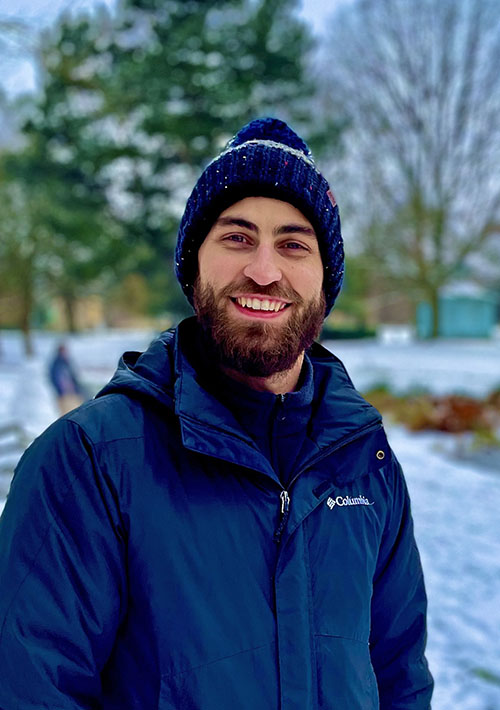Giamakis, Christos (Dr.)
Christos Giamakis holds a PhD (2022) in Archaeology from the Department of Archaeology, University of Sheffield. His studies in Sheffield were supported through a White Rose College of the Arts and Humanities AHRC competition studentship and a Doctoral Academy maintenance award, University of Sheffield.
Gielen, Demetrio Muñoz (Dr.)
Demetrio verrichtte wetenschappelijk onderzoek naar ruimtelijke gebiedsontwikkeling aan de Universiteit van Amsterdam. Sinds 2002 doet hij actief mee aan het publieke en wetenschappelijke debat over de bouwstagnatie en de problemen met de ruimtelijke kwaliteit in Nederland. Tevens is hij direct betrokken bij de zoektocht naar oplossingen vanuit verschillende rollen: als zelfstandige adviseur, als initiatiefnemer van debat, als ambtenaar en als wetenschapper. In 2010 promoveerde Demetrio aan de Radboud Universiteit
Gilhooly, Bernard (Dr.)
Bernard completed his BA, MA, and PhD in University College Dublin (UCD). His PhD focused on the manufacture and range of uses of Irish Mesolithic and Neolithic shale and porcellanite axes and adzes. This utilised a series of methodologies including quantitative and qualitative analysis, and the manufacture and use of experimental replicas. Bernard is an assistant keeper of antiquities in the National Museum of Ireland.
Glatz, Claudia (Prof. Dr.)
Claudia Glatz is Professor of Archaeology at the University of Glasgow. Her research interests centre around the material production as well as resistance against early states and empires at both the landscape scale and through material culture. She is the author of numerous journal articles on the subject as well as the monograph The Making of Empire in Bronze Age Anatolia (CUP, 2020). She currently directs the Sirwan Regional Project in the Kurdistan Region of Iraq, which combines regional survey, excavations, and cultural heritage initiatives. A first monograph summarising this work was recently published (Sidestone Press 2024: Place, Encounter, and the Making of Communities)
Gleser, Ralf (Prof. dr.)
Ralf Gleser holds the chair of Pre- and Protohistory at Münster University. One of his main research interests is the cultural development of central and south-east Europe in the Neolithic and Copper Age, with a particular focus on identities and material culture, early metallurgy, culture areas and cultural boundaries in the fifth and fourth millennia BC.
Goldberg, Martin (Dr.)
Martin Goldberg is Principal Curator of Medieval archaeology and history at National Museums Scotland. Martin works on early medieval and viking-age material culture and co-curated Celts and Scotland’s early silver. He is currently leading a major project on the viking-age Galloway hoard in collaboration with the University of Glasgow.
Gomart, Louise (Dr.)
Louise Gomart studied Prehistory at the University Paris 1-Panthéon Sorbonne, where she received her PhD in 2012. Her research focuses on the settlement dynamics and the social structure of the first agro-pastoral communities in continental Europe, through an “anthropological reading” of their ceramic productions. She is currently pursuing research within the team Trajectoires of the Centre National de Recherche Scientifique (CNRS) in Nanterre (France). Since 2008, she has regularly lectured in academic seminars of Prehistory and Ceramology at the University Paris 1 Panthéon-Sorbonne.
Giamakis, Christos (Dr.)
Christos Giamakis holds a PhD (2022) in Archaeology from the Department of Archaeology, University of Sheffield. His studies in Sheffield were supported through a White Rose College of the Arts and Humanities AHRC competition studentship and a Doctoral Academy maintenance award, University of Sheffield.
Gielen, Demetrio Muñoz (Dr.)
Demetrio verrichtte wetenschappelijk onderzoek naar ruimtelijke gebiedsontwikkeling aan de Universiteit van Amsterdam. Sinds 2002 doet hij actief mee aan het publieke en wetenschappelijke debat over de bouwstagnatie en de problemen met de ruimtelijke kwaliteit in Nederland. Tevens is hij direct betrokken bij de zoektocht naar oplossingen vanuit verschillende rollen: als zelfstandige adviseur, als initiatiefnemer van debat, als ambtenaar en als wetenschapper. In 2010 promoveerde Demetrio aan de Radboud Universiteit
Gilhooly, Bernard (Dr.)
Bernard completed his BA, MA, and PhD in University College Dublin (UCD). His PhD focused on the manufacture and range of uses of Irish Mesolithic and Neolithic shale and porcellanite axes and adzes. This utilised a series of methodologies including quantitative and qualitative analysis, and the manufacture and use of experimental replicas. Bernard is an assistant keeper of antiquities in the National Museum of Ireland.
Glatz, Claudia (Prof. Dr.)
Claudia Glatz is Professor of Archaeology at the University of Glasgow. Her research interests centre around the material production as well as resistance against early states and empires at both the landscape scale and through material culture. She is the author of numerous journal articles on the subject as well as the monograph The Making of Empire in Bronze Age Anatolia (CUP, 2020). She currently directs the Sirwan Regional Project in the Kurdistan Region of Iraq, which combines regional survey, excavations, and cultural heritage initiatives. A first monograph summarising this work was recently published (Sidestone Press 2024: Place, Encounter, and the Making of Communities)
Gleser, Ralf (Prof. dr.)
Ralf Gleser holds the chair of Pre- and Protohistory at Münster University. One of his main research interests is the cultural development of central and south-east Europe in the Neolithic and Copper Age, with a particular focus on identities and material culture, early metallurgy, culture areas and cultural boundaries in the fifth and fourth millennia BC.
Goldberg, Martin (Dr.)
Martin Goldberg is Principal Curator of Medieval archaeology and history at National Museums Scotland. Martin works on early medieval and viking-age material culture and co-curated Celts and Scotland’s early silver. He is currently leading a major project on the viking-age Galloway hoard in collaboration with the University of Glasgow.
Gomart, Louise (Dr.)
Louise Gomart studied Prehistory at the University Paris 1-Panthéon Sorbonne, where she received her PhD in 2012. Her research focuses on the settlement dynamics and the social structure of the first agro-pastoral communities in continental Europe, through an “anthropological reading” of their ceramic productions. She is currently pursuing research within the team Trajectoires of the Centre National de Recherche Scientifique (CNRS) in Nanterre (France). Since 2008, she has regularly lectured in academic seminars of Prehistory and Ceramology at the University Paris 1 Panthéon-Sorbonne.










